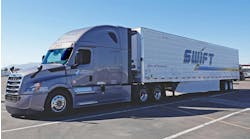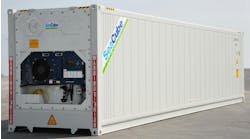Wabash targets ‘new business’ with MSC refrigerated truck body
As teased by company executives in recent earnings calls, Wabash has launched a new light-duty, home delivery refrigerated truck body with patented molded structural composite (MSC) technology. A "large national grocery retailer" has placed an initial order over $10 million for delivery in the first half of 2022, the company reported.
“We remain on track with our plan to scale our innovative molded structural composite technology within refrigerated vans, truck bodies and other transportation logistics and distribution-related products,” Wabash President, CEO and Director Brent Yeagy said last month. “We believe we have a unique technology and operational capability that has the ability to disrupt the broad cold-chain product market as well as change operating models for carriers and shippers.”
Wabash’s “minimum expectation” is for MSC vans to match its recent conventional reefer production of 4,000 to 5,000 trailers within the next couple of years, after building about 1,000 in 2022. Additionally, Yeagy suggested on the call that Wabash would build “at least 900 to 1,000” MSC-related truck bodies next year, targeting “primarily market share/new business creation.” And that’s just the beginning as Wabash and MSC “lean into the marketplace.”
“I think some things that we’ll be giving to [Wall Street] in the next several weeks, with detail, is some output with some very interesting work that we've been doing with multiple players in the area of refrigerated delivery, and how we're partnering with them to give them some very unique solutions with MSC,” he said.
Wabash’s new home delivery refrigerated truck body is designed to maximize both cargo capacity and delivery productivity on sub-10,000 GVWR chassis. The purpose-built design facilitates a rack and tote system unique to the food distribution industry while creating easy access to separate temperature zones for fresh and frozen goods. The design features walk-in side doors that provide cargo access for the driver.
Additional engineered solutions for the refrigerated home delivery market are currently in development, as Wabash anticipates an increasing need from customers to compete in a changing logistics and distribution environment fueled by ecommerce disruption.
“Collaborating with our customers on innovative efforts to improve grocery home delivery has been a rewarding journey,” said Kevin Page, Wabash’s senior vice president – customer value creation. “As a visionary leader in our industry, our approach is different because we’re different. We begin all of our R&D efforts with our eyes on what customers will need in the future. Over the last year, we saw the need to deliver a sustainable solution that helps grocery retailers meet home delivery goals while reducing their carbon footprints.”
The new light-duty refrigerated truck body features Wabash’s innovative MSC technology, which improves thermal efficiency up to 30%, reduces weight and provides a longer asset life, according to manufacturer. The improvement in thermal efficiency, compared to conventional refrigerated product designs, coupled with a lightweight design allows the operator to achieve better fuel efficiency as the refrigeration unit draws less energy to maintain temperature. In addition, the lightweight properties of Wabash’s MSC technology can facilitate the adoption of an electric chassis in a refrigerated application.
“Our MSC technology has undergone careful development, including extensive on-road testing to document the composite material’s ability to maintain temperature efficiently, reduce weight and lengthen asset life,” Page added. “The time is right to scale production of this technology for the refrigerated transportation space. Customers are realizing that sustainability initiatives help their bottom line, and Wabash is moving quickly to provide solutions that improve asset performance while reducing environmental impact.”




